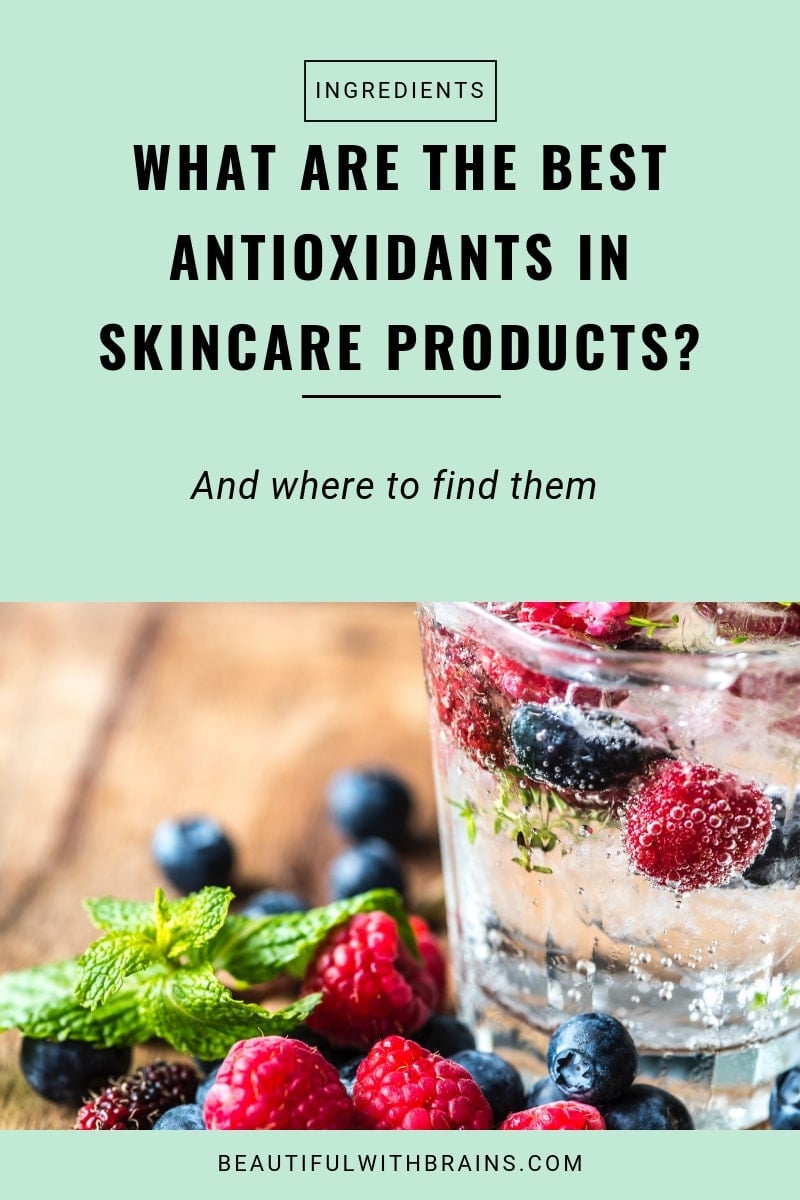
What are the best antioxidants in your skincare products? Everyone’s raving about Vitamin C, but that’s not the only powerhouse that prevent wrinkles from making an early appearance. You also have Vitamin E, green tea… and a gazillion others that go by weird name that makes them look like dangerous chemicals when they’re the friendliest allies your skin could have. They protect your skin from environmental aggressors, reduce the damaging effects of pollution, and even give your sunscreen a boost.
The best part? Anyone can use antioxidants. No matter how sensitive your skin is, what type you have, or what concern you’re dealing with, antioxidants are universal actives that keep your complexion younger-looking no matter what. But with so many options on the market – and every brand promises their chosen antioxidant is the best – how do you pick the one that’s right for you. Are they all created equal so you can go for the cheapest? Or are there some types that are better than others?
Time to end the confusion once and for all, me thinks. Here’s a roundup of some of the best antioxidants commonly found in skincare, so you can easily chose the one that’s right for your skin type.
What Are Antioxidants?
Antioxidants are little soldiers that fight free radicals, the nasty molecules that give you wrinkles. “Think of antioxidants as a sponge that sops up free radicals,” says Sandy Skotnicki, MD, a board-certified dermatologist and assistant professor at the University of Toronto department of medicine.
It works like this. Your body generates free radicals through metabolic processes like breathing. To protect itself, your skin then produces natural antioxidants to naturalise these free radicals, slowing down the aging process. But in our modern society, this isn’t enough. Pollution, unprotected sun exposure, a diet rich in processed foods, smoking, and all the other usual culprits generate free radicals inside your body, too. Your skin then becomes unable to produce enough natural antioxidant to counteract this new onslaught… and that’s where you need help from the outside.
Why are free radicals so bad? Free radicals are unstable because they have one or more unpaired electrons. In order to become whole again, they attack other molecules to steal the missing electron from them. This process destroy collagen, elastin, and cellular DNA as well as triggering the inflammatory process. The results? Premature wrinkles. Saggy skin. Dark spots. Antioxidants patrol your body looking for free radicals. When they find one, they neutralise it before they can start their destructive chain reaction. Less damage = fewer wrinkles = younger-looking skin.
Antioxidants Benefits For Skin
Now you know what they are and roughly how they work, here are all the ways antioxidants benefit skin:
- They boost sunscreen effective and provide protection from photodamage
- They stimulate the production of collagen, the protein that keeps your skin firm
- They slow down premature aging and the formation of early wrinkles
- They reduce inflammation, the root cause of any skin woe, from wrinkles to acne, dark spots, and rosacea
- They reduce DNA damage from sun exposure
Antioxidants Side Effects
Antioxidants are generally so gentle, anyone can use it. It’s true that some antioxidants, like L-Ascorbic Acid (the pure form of Vitamin C), can irritate sensitive skin in high doses. But that’s the exception. Most antioxidants don’t cause dryness or irritations, as more powerful anti-aging actives like retinal and glycolic acid do.
What Are The Best Antioxidants In Skincare?
Alpha Lipoic Acid (ALA)
WHAT IS IT:
Alpha Lipoid Acid (ALA for short) is an enzyme soluble both in water and fat. It easily penetrates the skin.
WHAT IT DOES:
This enzyme has powerful antioxidants properties that fight free radicals before they give you wrinkles. But that’s not all. Alpha Lipoic Acid has another superpower: it’s able to regenerate Vitamins C and E, enhancing their effectiveness.
SIDE EFFECTS:
All antioxidants degrade when exposed to light and air, but ALA is more vulnerable to this. Plus, in high concentrations (about 5% or more) can cause burning and stinging.
BEST PICKS:
- Mad Hippie Hydrating Nutrient Mist ($19.99): This refreshing mist features every antioxidant you can think of, including Alpha Lipoid Acid. Available at iHerb and Ulta.
Need help creating an anti-aging routine that really works? Sign up to the newsletter below to receive the “Anti-Aging Skincare Routine Cheatsheet” (it includes product recommendations, too!).
Coenzyme Q10 (aka Ubiquinone)
WHAT IT IS:
A fat soluble antioxidant present in all human cells. It’s also known as Ubiquinone. It was made famous by Nivea, it’s their key antioxidant of choice.
WHAT IT DOES:
Like all antioxidants, it fights free radicals and neutralises them before they can wreak too much damage. Plus, it stimulates the production of collagen, the protein that keeps skin firm. Finally, it reduces UV damage.
SIDE EFFECTS:
None. It’s very gentle and suitable for all skin types, including sensitive.
BEST PICKS:
- DHC CoQ10 Lotion ($37.00): A hydrating lotion with hyaluronic acid, amino acids, and Coenzyme Q10 to make skin supple and soft. Available at Dermstore
- Indie Lee CoQ-10 Toner ($38.00): A soothing toner with anti-inflammatory extracts to reduce irritations. It also has ubiquinone to prevent wrinkles. Available at Blue Mercury, Dermstore, and Ulta
- Paula’s Choice Resist Super Antioxidant Concentrate Serum ($38.00): This silky serum contains every antioxidant under the sun, including ubiquinone. Available at Dermstore, and Paula’s Choice
Related: Everything You Ever Wanted To Know About Coenzyme Q10
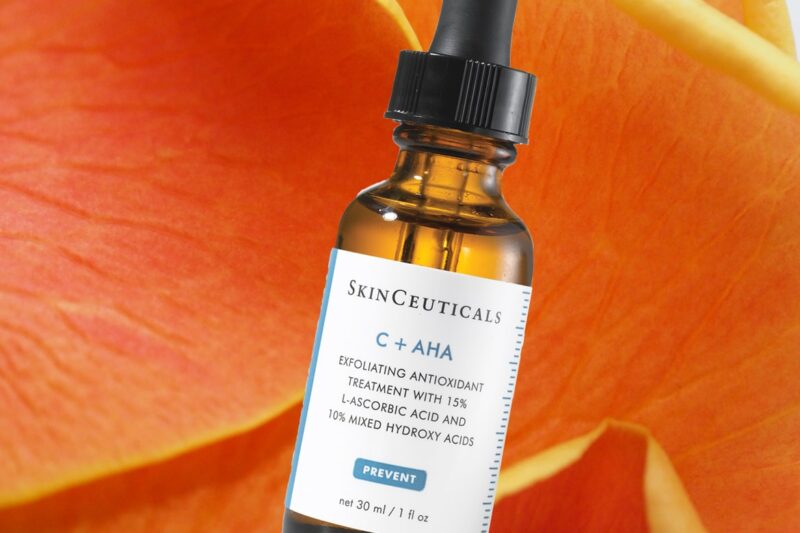
Ferulic Acid
WHAT IT IS:
Ferulic acid is a plant-based antioxidant naturally present in the cell walls of whole grains, coffee, spinach, orange, apples, parsley, grapes and other vegs and fruits.
WHAT IT DOES:
Ferulic Acid is sort of unique as an antioxidant. While most antioxidants only neutralise one type of free radicals, Ferulic Acid neutralises THREE (superoxide, hydroxyl radical, and nitric oxide). Like that weren’t enough, it also boosts sun protection and helps your sunscreen do a better job. It works best when paired with Vitamins C and E, as it creates an acidic environment that helps L-Ascorbic Acid (the pure form of Vitamin C) last longer.
SIDE EFFECTS:
None. Ferulic Acid itself doesn’t have the best smell, but it doesn’t have any side effects for your skin.
BEST PICKS:
- MaeLove Glow Booster ($27.95): The cheapest Vitamin C serum in this list, it does everything the others do, but it contains a citrus extract that may be irritating for sensitive skin. Available at Maelove.
- Paula’s Choice C15 Booster ($46.75): It’s enriched with Hyaluronic Acid and glycerin to deeply hydrate skin. Available at Cult Beauty, Dermstore, Net-A-Porter, Paula’s Choice, Sephora, and SpaceNK.
- Skinceuticals CE Ferulic ($169.00): The original Vitamin C serum, it costs an arm and a leg, but it works wonders and delivers what it promises. Available at Dermstore and Skinceuticals.
Related: Everything You Ever Wanted To Know About Ferulic Acid
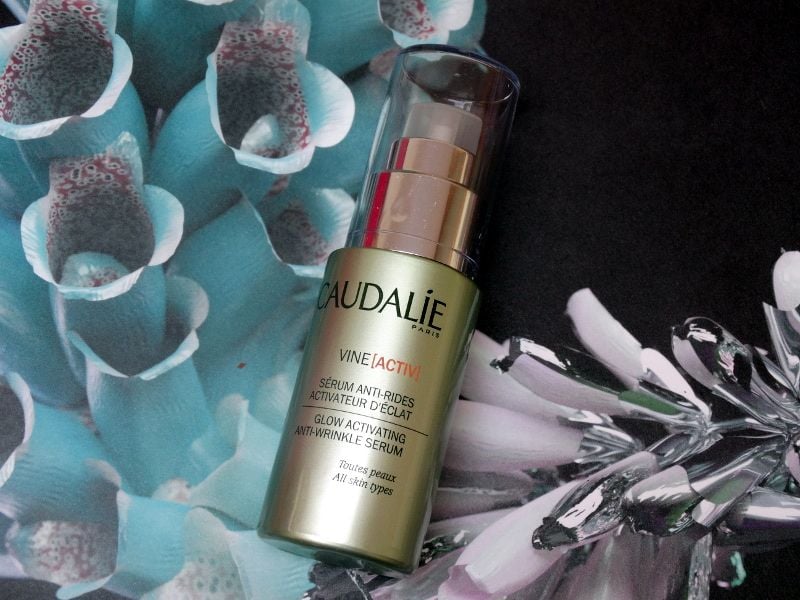
Grape Seed Extract
WHAT IT IS:
Grape seed extract is an extract that contains lots of antioxidants, including anthocyanins, flavonoids proanthocyanidins and polyphenols.
WHAT IT DOES:
You guessed it, it helps fight free radicals, preventing premature wrinkles. While it’s at it, it also improves collagen synthesis, so that your skin has more collagen as you grow older. More collagen = firmer skin. Finally, it helps to reduce sun damage.
SIDE EFFECTS:
None. It’s very gentle, even for very sensitive skin.
BEST PICKS:
- Exuviance Age Reverse HydraFilm ($79.00): A gentle moisturiser, enriched with shea butter and amino acids, to make dry skin soft and supple. It also has grape seed extract to prevent wrinkles. Available at Dermstore and Ulta
- Paula’s Choice Clear Ultra-Light Daily Hydrating Fluid SPF 30+ ($38.00): A lightweight sunscreen loaded with antioxidants to prevent premature aging and UV damage. It’s mostly suitable for oily skin, but anyone can use it. Available at Cult Beauty, Paula’s Choice, and SpaceNK.
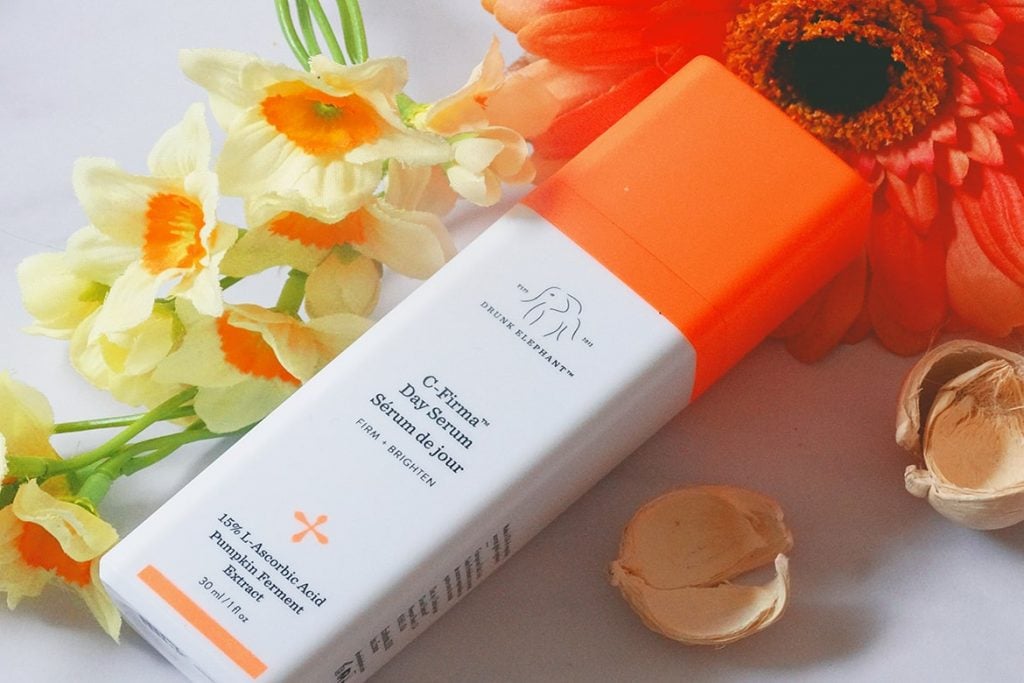
Green Tea
WHAT IT IS:
The name kinda gives it away, doesn’t it? It’s an extract derived from green tea, which is loaded with polyphenols (a family of powerful antioxidants).
WHAT IT DOES:
Polyphenols are powerful antioxidants that fight free radicals and protect skin from the harmful sun rays. It does this in two ways. First off, like all antioxidants, it neutralises free radicals before they can start their destructive chain reaction. Plus, they have anti-inflammatory properties that can reduce redness and irritations, even when they’re caused by UV rays. Epigallocatechin-3-gallate, the most powerful antioxidant in green tea, reduces collagen breakdown, too.
SIDE EFFECTS:
None. This is another antioxidant that’s very safe and doesn’t cause irritations or problems. You could even drink it (I’m suggestion you can make yourself a cup of green tea, NOT eating your skincare products with green tea extract).
BEST PICKS:
- Drunk Elephant C-Firma Day Serum ($80.00): A Vitamin C serum with green tea to prevent wrinkles. It has a sticky texture, and is better suited for dry skin. Available at Boots, Cult Beauty, and SpaceNK.
- MD SolarSciences Mineral Creme Broad Spectrum SPF 50 UVA-UVB Sunscreen ($42.00): A silky mineral sunscreen with a sprinkle of antioxidants to prevent wrinkles and sun damage. It may leave a white cast behind on darker skin tones. Available at Dermstore and Revolve.
- Paula’s Choice Skin Balancing Super Antioxidant Concentrate Serum With Retinol ($34.00): An anti-aging serum with every antioxidant under the same. Retinol is very powerful and can dry out skin if abused, so use it only every other night. Available at Paula’s Choice
Related: The Complete Guide To Green Tea In Skincare
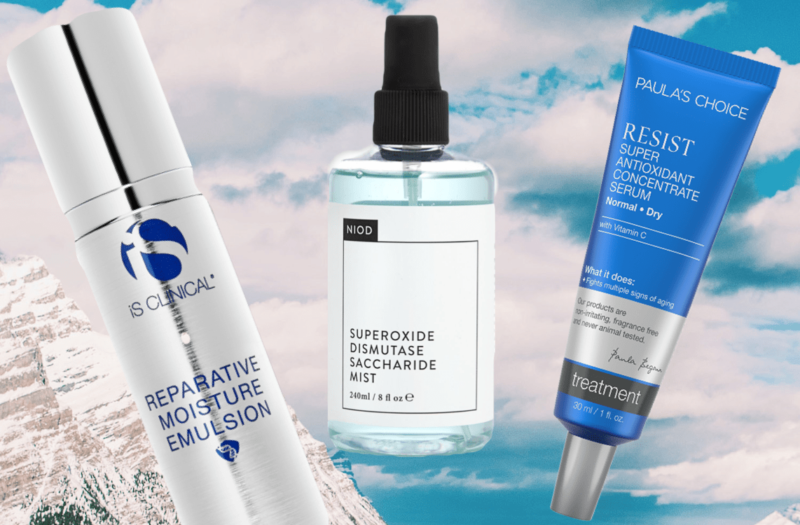
Superoxide Dismutase (SOD)
WHAT IT IS:
Superoxide Dismutase (or SOD for short) is an antioxidant enzyme found in all living cells. Antioxidant enzymes are enzymes that behave like antioxidants. Your body naturally produces them when your cells are being attacked by free radicals to reduce DNA damage.
It’s possibly the most powerful antioxidant your body creates. Exciting, right?
WHAT IT DOES:
Superoxide Dismutase is able to destroy the worst type of free radical ever, Super Oxide. It’s the most common type of free radical in the body and primary trigger of inflammation, the root cause for pretty much every skin woe, including wrinkles, dark spots, and acne. So anything that can kill it is good news for your skin. Plus, it also reduces UV damage and soothes sunburn-induced redness.
SIDE EFFECTS:
Again, none. It’s a very gentle antioxidant and anyone can use it.
BEST PICKS:
- iS Clinical Reparative Moisture Emulsion ($90.00): A super hydrating hyaluronic acid serum with a few antioxidants thrown in. It makes skin softer and smoother and helps to prevent wrinkles. Available at Dermstore
- Niod Superoxide Dismutase Saccharide Mist (£34.00): A mist with Superoxide Dismuatse (and not much else). If you don’t want to change your moisturisers/serums, but want to incorporate this antioxidant into your skincare routine, this is a good way to do it. Available at Beauty Bay and Niod
- Paula’s Choice Resist Anti-Aging Antioxidant Serum ($35.00): A silky serum with every antioxidant you can think of. Available at Dermstore and Paula’s Choice
Related: The Complete Guide To Superoxide Dismutase In Skincare
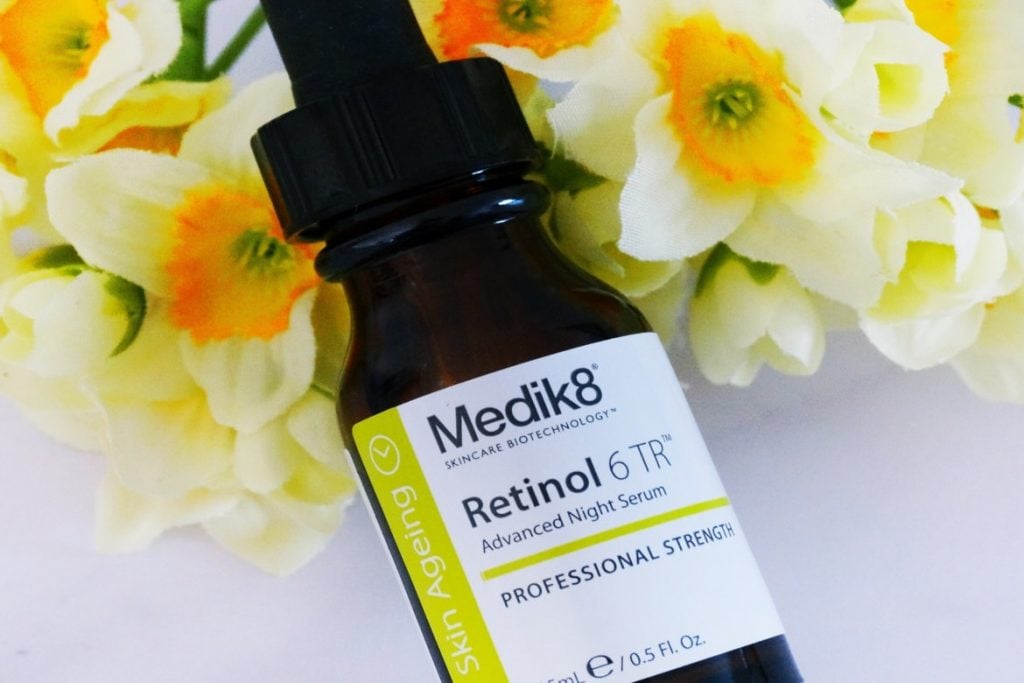
Vitamin A
WHAT IT IS:
A fat-soluble vitamin that comes in many forms. The most common in skincare are retinol, retinyl palmitate, retinoic acid and retinaldehyde. If it has “Retin” in the name, it’s usually a form of Vitamin A.
WHAT IT DOES:
Vitamin A is the only thing that really reduces wrinkles. It does it in three ways. First, it neutralises free radicals before they can destroy collagen and elastin. Two: It speeds up cellular turnover (the skin’s natural exfoliating process), so that your skin look softer and suppler. And finally, it boosts the production of collagen, the protein that keeps your skin firm. The more collagen your skin is, the fewer wrinkles you’ll have.
SIDE EFFECTS:
Unlike other antioxidants on this list, Vitamin A is harsh and has side effects. It can cause redness, stinging and irritation. Start with small concentrations twice a week and build your way up from there.
BEST PICKS:
- Paula’s Choice Skin Balancing Super Antioxidant Concentrate Serum With Retinol ($34.00): A low strength retinol for beginners loaded with every antioxidant you can think of to help you prevent premature aging. It’s lightweight and suitable for combination and oily skin types. Available at Paula’s Choice
- Paula’s Choice Skin Recovery Super Antioxidant Concentrate Serum with Retinol ($34.00):A low strength retinol for beginners with dry skin. It’s chockfull of every antioxidant under the sun to prevent premature wrinkles. Available at Paula’s Choice
- The Ordinary Granactive Retinoid 2% In Squalane (£7.80): Granactive retinoid is a gentler form of Vitamin A that retinol. The jury’s still out there how well it works compared to retinol, but it’s a good option for beginners or people with sensitive skin. Available at Beauty Bay, Cult Beauty, and Sephora
Related: Which Form Of Retinoid Is Right For You?
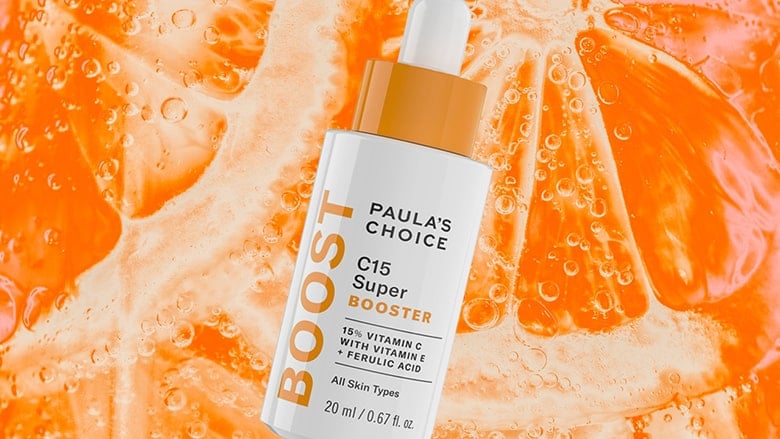
Vitamin C
WHAT IT IS:
Vitamin C is a water soluble vitamin that comes in many forms, including L-Ascorbic Acid, Ascorbic Palmitate, Magnesium Ascorbyl Phosphate, Sodium ascorbyl Phosphate and Ascorbyl Glucoside. If it has “Ascorb” somewhere in the name, it’s usually a form of Vitamin C. It’s one of the most powerful antioxidants in skincare and the one pretty much every dermatologist agrees you should be using.
WHAT IT DOES:
Vitamin C prevents wrinkles in several ways. First off, it neutralises free radicals before they give you wrinkles. It’s also a key part of the collagen-boosting process, ensuring your skin stays firmer for longer. Plus, it boosts the protection of your sunscreen (it does this better when paired with Vitamin E and Ferulic Acid). Keep in mind that most of these studies were done on L-Ascorbic Acid. Brands will tell you that other derivatives work just as well, but we have no proof that’s true.
SIDE EFFECTS:
L-Ascorbic Acid (the pure form of Vitamin C) can irritate sensitive skin in high concentrations (15%+). If you have sensitive skin, you may want to try one of the derivatives, even if it’s less effective. L-Ascorbic Acid also goes bad quickly, so buy it only when you’re ready to use it. Don’t stock up on Black Friday sales, the serum will be useless once you get round to using it. Finally, because it’s water-soluble, it needs to be formulated in an oily base to be able to penetrate the skin’s lipid barrier. Oily skin may not like this very much.
BEST PICKS:
- MaeLove Glow Booster ($27.95): The cheapest Vitamin C serum in this list, it does everything the others do, but it contains a citrus extract that may be irritating for sensitive skin. Available at Maelove.
- Paula’s Choice C15 Booster ($46.75): It’s enriched with Hyaluronic Acid and glycerin to deeply hydrate skin. Available at Cult Beauty, Dermstore, Net-A-Porter, Paula’s Choice, Sephora, and SpaceNK.
- Skinceuticals CE Ferulic ($169.00): The original Vitamin C serum, it costs an arm and a leg, but it works wonders and delivers what it promises. Available at Dermstore and Skinceuticals.
Related: The Most Common Types Of Vitamin C In Skincare: Which One Is Right For You?
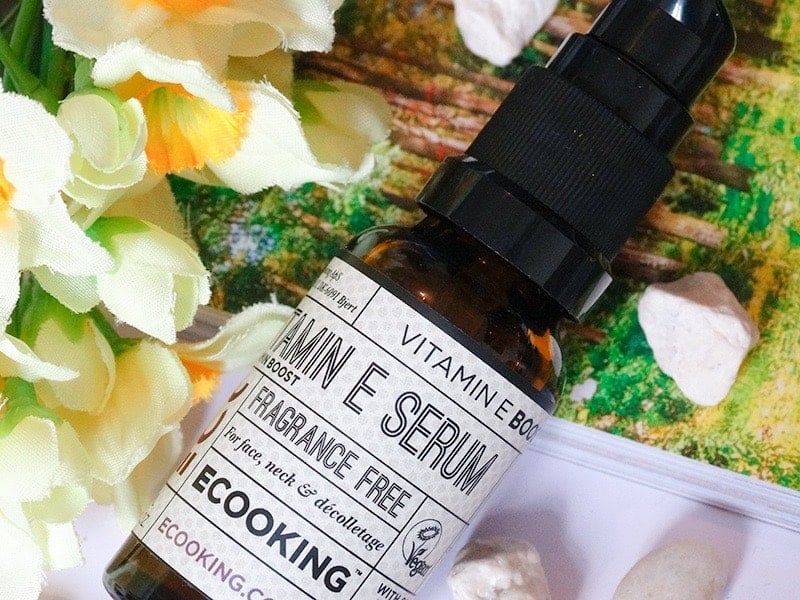
Vitamin E
WHAT IT IS:
A fat soluble vitamin that comes in many forms, including Alpha-Tocopherol and tocotrienols.
WHAT IT DOES:
Like all antioxidants, it fights free radicals and boosts sun protection. You’ll rarely see Vitamin E alone. It’s often paired with Vitamin C and Ferulic Acid because it works much better with them around. Plus, Vitamin E “is known for its hydrating properties and can be beneficial for dry or sensitive skin types, as it’s also very soothing,” says NYC board-certified dermatologist Dr Robyn Gmyrek, MD. Finally, its antioxidant properties also help other antioxidants last longer, thus increasing the shelf life of skincare products.
SIDE EFFECTS:
None. This is an antioxidant pretty much anyone can use, no matter how dry or sensitive your skin is.
BEST PICKS:
- MaeLove Glow Booster ($27.95): The cheapest Vitamin C serum in this list, it does everything the others do, but it contains a citrus extract that may be irritating for sensitive skin. Available at Maelove.
- Paula’s Choice C15 Booster ($46.75): It’s enriched with Hyaluronic Acid and glycerin to deeply hydrate skin. Available at Cult Beauty, Dermstore, Net-A-Porter, Paula’s Choice, Sephora, and SpaceNK.
- Skinceuticals CE Ferulic ($169.00): The original Vitamin C serum, it costs an arm and a leg, but it works wonders and delivers what it promises. Available at Dermstore and Skinceuticals.
Related: 4 Reasons To Use Vitamin E (And 1 Why You Shouldn’t)
HOW TO THE MOST OUT OF ANTIOXIDANTS
Now you know what antioxidants to look for in your skincare products, here’s how to make the most out of them:
Should You Opt For A Lotion Or Serum?
Cleansers aside, I believe every skincare product should have its fair share of antioxidants. Sadly, most of them don’t even have the tiniest drop. And those that do tend to be more expensive. So, if you need to choose between a moisturiser with antioxidant or a serum with antioxidants, opt for the latter. Serums tend to to contain a higher concentration of antioxidants, so they work better.
How Many Antioxidants Should A Serum Contain?
The more, the merrier. “Each antioxidant offers unique benefits, so a combination of them can provide more comprehensive protection against free radicals,” says Dr. Gmyrek. This is why I’m NOT a fan of one-active products a la The Ordinary. Sure, they’re super cheap, but you only get one antioxidant. If you want more, you need to buy more products, which means investing more money and spending more time doing your skincare routine. I’d rather splurge a little more and get a product with several antioxidants. This is especially important with Vitamin C. Studies show the best combination is 15% L-Ascorbic Acid, 1% Vitamin E and 0.5% Ferulic Acid. If your Vitamin C serum doesn’t contains Vitamin E and ferulic acid, you’re selling out on your skin. Period.
When Should You Use An Antioxidant Serum?
You can use most antioxidant serums both in the morning and evening. I prefer to use them in the morning, especially when they contain 15% L-Ascorbic Acid (Vitamin C), to boost the protraction of your sunscreen. Even the best sunscreens let between 1-3% of UV rays through. Once they hit your skin, they start generating wrinkle-inducing free radicals. Antioxidants can intercept and neutralise these free radicals before they wreak their damage.
Board-certified dermatologist Dr. Sandy Skotnicki agrees: “Even if you’re diligent about sunscreen application and reapplication, the reality is that you’re still going to get some free radical damage from both UV light and pollution. Antioxidants act as a second layer of protection throughout the day.” Also, I don’t recommend using 15% L-Ascorbic Acid more than once a day. It’s harsher than most antioxidants, so use it in moderation.
How Long Will It Take To See Results?
Antioxidants are preventative, so don’t expect to see results any time soon. Their job is to prevent or slow down the formation of wrinkles, so you’ll know they work when you don’t see them making an appearance too soon.
Should You Buy Antioxidant Moisturisers That Come In Jars?
Light and air spoil antioxidants, making them effective overtime. It’s not an immediate process, but why risk it? Opt for skincare products that come in airtight and opaque bottles and tubes that keep your antioxidants safe from their enemies.
At what concentrations do antioxidants work?
As a rule, the higher an antioxidant is on the ingredient list, the better it’ll work. So many brands just use a sprinkle of antioxidant, promising miracles. You’ve guessed it, that’ll barely do anything for you. But beware of very high concentrations. After 15%, Vitamin C can irritate skin. Same with Vitamin A. The higher the dose, the worse the side effects. The best does if the one that gives you results without side effects.
The Bottom Line
There you have it, the best antioxidants used in skincare. There’s not an antioxidant that’s better than the rest. Just like you don’t need just kale, your skin doesn’t need just Vitamin C. Each antioxidant neutralises a different type of free radicals, so the more you use, the better results you’ll get and the slower you’ll age.


this is very useful!!
at the moment, I’m using a witch hazel daycream with vitamin a, c, and e!
thanks for posting 😀
Celeste, I’m glad you find it useful. The cream you’re using contains some great antioxidants. 🙂
I never knew I used so many products with antioxidants until I read this. My serum and moisturizer contain Vitamins A, C and E, and green tea extract. Some of my face makeup has antioxidants too. So, why don’t look younger? LOL!
Tammy, lol. It’s great that you use so many products with antioxidants. They may seem like they aren’t doing much now, but you’ll see the difference when you’re older and you won’t look your real age. 😉
Speaking about antioxidants, im willing to buy a vitamin C serum cause is not expensive as many others with this active ingredient and claims to have 10%, its Orangedaily 10% vitamin C serum. It comes in an opaque and airtight package and has no water but since ascorbic acid is not too stable I have some doubts….
Here are the ingredients:
Isododecane, Ascorbic Acid (Vitamin C), Jojoba (Buxus Chinensis) Oil, Ethylene Mixed Copolymer, C12 15 Alkyl Benzoate, Cetearyl Alcohol, Tocopheryl Acetate (Vitamin E), Retinyl Acetate (Vitamin A), Peueraria Thunberigiana Extract, Alfalfa (Medicago Sativa) Extract, Licorice (Glycyrrhiza Glabra) Extract, Sarsaparilla (Smilax Aristolochiaefolia) Extract, Tansy (Tanacetum Vulgare) Extract, Citric Acid, Glyceryl Oleate, BHA, BHT, Propyl Gallate, Propylene Glycol, Soybean (Glycine Soja) Oil, Corn (Zea Mays) Oil
What do you think?? would it work?
Thanks a lot, i really appreciate that theres (few) blogs like yours who has a serious approach to beauty.
Alejandra, thank you, I’m glad that you enjoy my blog, I hope to see you around often.
As for the serum, I think it has a good formula and I like that it contains a few antioxidants. You are right when you say that Ascorbic Acid is not very stable but if it is in an airtight and opaque packaging, that shouldn’t be much of a problem. What worries me most about Ascorbic Acid is that its acid part can cause irritations, although the other antioxidants in the formula should soothe it. It’s not a bad product at all and it should work well (of course antioxidants prevent premature aging so you would see the results overtime, not straight away) but personally, I prefer products with more stable, less irritating forms of Vitamin C as I think they work better. Hope this helps.
Thanks a lot, the thing is I need a product with at least 5% of vitamin c and most are over 50 dollars, besides I have to pay for shipping costs (im in South América, here we cant buy a loot of products, it really sucks). Theres a good Paula Begoun product for 25 bucks, ill try to buy it too.
Ill definitely be around often!!.
Alejandra, you’re welcome. I live in Italy and a lot of products aren’t available here either unless you buy them online and the shipping charges can be quite high so I know how frustrating it can be without breaking the bank. *sighs* I haven’t had the chance to try Paula Begoun products but they are well-formulated and I think her Vitamin C product would work very well. 🙂
I’m glad to hear that. 😉
I was trying to learn and find common antioxidants just a few days ago and you’ve answered my prayers. Bookmarked ;]!
Janessa, what a coincidence! I’m glad I could be of help. 🙂
Sorry to comment on an old post, but I just discovered your blog and thoroughly enjoying it! Question that came to mind as I was reading this post: what (if any) is the real difference between eating anti-oxidants and applying them on your skin? Are there some that we should be consuming one way or the other, and does bioavailability change? I thought this as you mentioned green tea, which I drinks liters of everyday – aren’t we fundamentally better off trying to eat them instead? Does it matter? Are the celeb vitamin drips somehow even more optimal? Keen to hear your thoughts!
Camille, thank for your comment and your support, I appreciate it. You’re absolutely right, it’s way better to get your antioxidants from your food than skincare products and vitamin drips. That’s how nature designed us to consume them and make the most of them. But a lot of people, for one reason or another, don’t have the chance to eat many antioxdants-rich foods. Getting their fix from skincare won’t be as effective but hey, every little bit helps. I personally try to eat a healthy diet but I always look for antioxidants in my skincare products just to give my skin that extra boost. 🙂